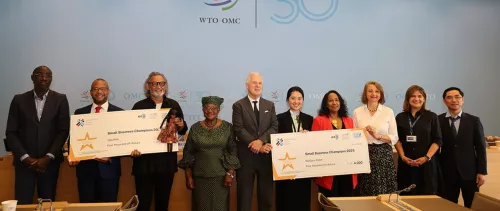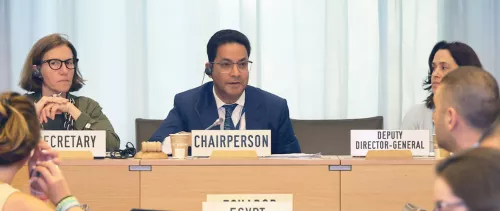
At a meeting of the Informal Working Group on Micro, Small and Medium-sized Enterprises (MSMEs), held on 24 June, WTO members discussed a draft ministerial declaration, a key element in the Group’s preparations for the WTO’s 12th Ministerial Conference (MC12). They also looked at implementation of the package of declarations and recommendations for MSMEs adopted in December 2020.
The draft declaration reaffirms the Group's commitment to address challenges facing MSMEs seeking to trade internationally. In addition, it recognizes the negative impact of COVID-19 on small business and the need for a global coordinated response to help MSMEs bounce back. It also takes stock of the Group's work since it was established at the 11th WTO Ministerial Conference in Buenos Aires in December 2017.
The Group aims to produce a final draft by its next meeting at the end of July and to use the period leading up to MC12 at the end of the year to reach out to other WTO members to join the declaration. The aim of the Group is to adopt the declaration at MC12.
On the implementation of the package of recommendations for MSMEs, Côte d'Ivoire updated the Group on its proposal to help MSMEs gain access to trade finance, which was first discussed at the Working Group on Trade, Debt and Finance in May this year. The proposal responds to the Group's recommendation to highlight MSME issues at other WTO committees where relevant.
Canada updated the Group on its procedure for automatic transmission of tariff and trade data to the WTO's Integrated Data Base (IDB). Keeping the IDB fully up to date was one of the package's recommendations so that MSMEs can have access to reliable and comprehensive information on tariffs and other market access data.
Mexico updated the Group on the development of the Trade4MSMEs platform, which will bring together trade-related information useful for small business and policy makers. The Group is aiming to launch this platform at MC12.
Ecuador updated members on its proposal on MSMEs and innovation policies. The proposal is to collect, via a questionnaire among the members of the Group, best practices that help address barriers to innovation faced by MSMEs.
Brazil updated members on its proposals on rural MSMEs, with a special focus on agritech. Brazil proposed that the Group exchange best practices on policies related to rural MSMEs, which make up a significant percentage of the economic operators in developing economies, and to hold a dialogue on trade facilitation and rural MSMEs. This would be in line with one of the recommendations adopted by the Group, which calls for full implementation of the Trade Facilitation Agreement and the exchange of best practices to ease the difficulties faced by MSMEs.
A representative from the United Nations Commission for International Trade Law (UNCITRAL) gave a presentation to the Group on the importance of its Model Law on Electronic Transferable Records (MLETR) for facilitating MSMEs' participation in digital trade. The International Chamber of Commerce — United Kingdom presented the findings of their report on the same topic, which highlights the economic benefits of digitalising trade documentation and aligning to the UNCITRAL Model Law on Electronic Transferable Records for MSMEs in the United Kingdom.
A representative from Bahrain's Economic Development Board gave a presentation on Bahrain's experience with enacting the MLETR over the past two years.
The WTO Secretariat gave a presentation on MSME provisions in regional trade agreements and on the MSMEs RTA database available on the WTO website.
Abu Dhabi Global Markets (ADGM) explained how its digital lab is helping small business access finance. The digital lab connects start-ups, financial institutions and ADGM's Financial Services Regulatory Authorities to the latest technologies and partnership opportunities in the financial markets.
The International Chamber of Commerce Council of MSMEs in Argentina gave a presentation on the recently established High Level SMEs Council and its activities in relation to the Sustainable Development Goals.


